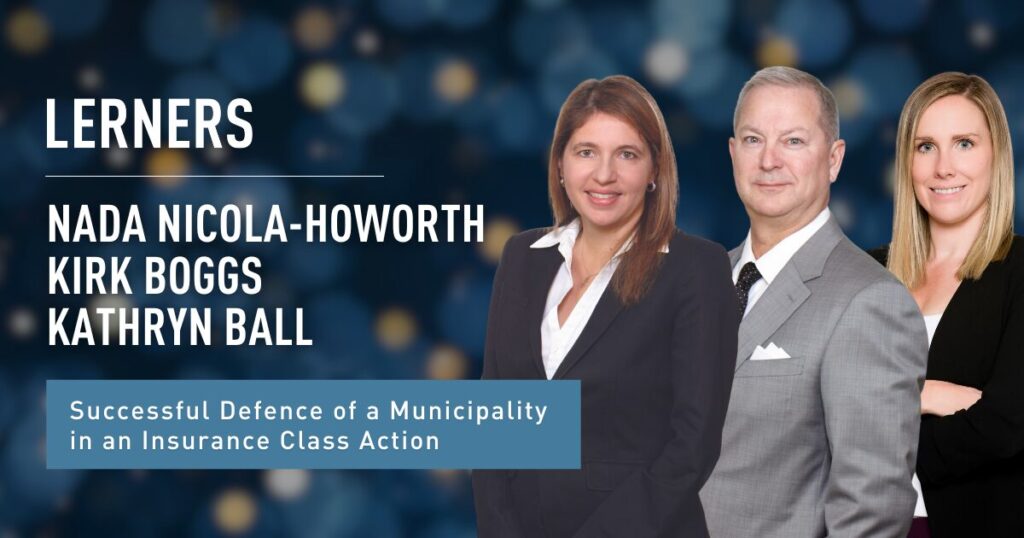About News
Lerners Represents Successful Defendant in Long-Term Care Class Action Certification Motion
Congratulations to Nada Nicola-Howorth, C. Kirk Boggs and Kathryn Ball on their recent successful defence of the Regional Municipality of Durham, a defendant in Pugliese v. Chartwell, 2024 ONSC 1135, a proposed class action related to alleged negligence in long-term care (LTC) homes during the COVID-19 pandemic.
Eight proposed class actions were brought by the estates of individuals who died as a result of COVID-19, and people who were infected by COVID-19 allegedly contracted in LTCs during the pandemic. The certification motions in these eight actions were argued before Justice Morgan in January and February of 2024. Justice Morgan certified six of the eight actions for litigation as class proceedings, however, he dismissed the certification motion in the action against the Regional Municipality of Durham and other municipal defendants. In his reasons Justice Morgan made a number of key findings with respect to the litigation, including:
- Owing to the Supporting Ontario’s Recovery Act, there was no viable cause of action against any defendant except in negligence. The required standard was to prove “gross negligence”.
- Fundamental principles of negligence cannot be ignored when analyzing whether a viable cause of action in negligence can be certified on behalf of a class. In particular, a viable action requires a plaintiff who has been harmed and a defendant directly tied to that plaintiff who is alleged to have caused that harm. Without that relationship there is no viable cause of action.
- A theory of liability based on corporate “top down” fault – i.e. systemic negligence arising from gross negligence at the upper levels of management in appropriate corporate structures – was viable for some of the actions, but not the action against the Regional Municipality of Durham.
- Based on the evidence put forward, unlike the corporate homes actions, there was no basis for a conclusion that anything that happened in any LTC home located elsewhere could be used to analyze potential liability relating to any outbreak in a Durham Region LTC home.
- Causation could not be resolved on a class-wide basis. For any action certified, causation would need to be analyzed on a home-by-home mini-trial basis after a finding of liability in that action.
- Contrary to the plaintiffs’ submission, the Raganoonan principle, which states that there must be a named representative plaintiff with a direct legally viable claim against each named defendant, continues to be the law in Ontario. In light of the fundamental requirements for a successful claim in negligence, and the evidence considered by the court, the absence of a representative plaintiff for any claim against Durham was fatal to the proposed class action against it.
- Plaintiffs’ counsel’s request that individual defendants identify a potential representative plaintiff to sue them represented an enormous and unfair burden to place on the defendants. On this point, Justice Morgan accepted the detailed evidence put forward by the Region of Durham.
- On consideration of all the factors and issues related to this fact situation, a class action was not the preferable procedure for any claims that might exist against the municipalities.
Overall, the decision represents an important reminder that a proposed class action, even if procedurally different from an individual action, is still an action and must be analyzed using fundamental legal principles.
In particular, the procedural flexibility contemplated by the Class Proceedings Act, 1992 cannot be used to circumvent fundamental principles of negligence law – there must be a lis and “the notion of starting a lawsuit without a client and compelling a defendant to find one is…a step too far.” (para 15)
Lerners’ Specialty Risk and Insurance Group represents insurers, municipalities, corporations and public entities with respect to a wide range of matters in numerous areas of risk, including municipal, police and public entity liability, specialty lines coverage, complex property loss claims, privacy & cyber, tech, E&O, D&O, aviation and climate change. The Group is particularly experienced in coverage, class actions, complex insurance claims and subrogation matters, having successfully defended a multitude of complex claims and appeals on behalf of their clients.
For more information, or to arrange an interview with one of our lawyers, please contact
Orna Dobner
Chief Brand and Strategy Officer
Lerners LLP
416.601.2393
News Listing Sidebar
Recent News
-
Lerners Once Again Recognized As "Best Law Firm" in London by London Inc. Magazine
-
A Lerners Lawyer is President of OTLA for the Third Time
-
Lerners Welcomes New Associate Efua K. Gyan
-
Ryan McNeil Quoted in LawTimes
-
Lerners Represents Successful Defendant in Long-Term Care Class Action Certification Motion
